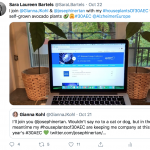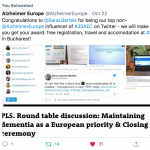Alzheimer Europe Conference 2020: COVID19, technological solutions, and attendee’s houseplants
Initially, I worried that a 3-day online conference might lead to ‘Zoom-fatigue’ and that the virtual format would negatively impact the special atmosphere I associate with Alzheimer Europe Conferences. However, the AEC team did not disappoint, but instead provided the conference attendees with an excellent interactive, engaging, and interesting experience that allowed us to learn, network, and discuss with people from around the world, while staying in the comfort of our homes.
Next to the topic of COVID19 and its devastating impact on so many older adults, people with dementia, carers, and especially residents in care homes, I was pleased to see numerous presentations on implementation issues and outreach activities. For example, Dr. Halek from the University of Witten/Herdecke talked about using a theory of change model as part of intervention development. Furthermore, my colleague Dr Christie from Maastricht University highlighted the importance of check-points and flexible research designs when implementing eHealth into practice, and the French Alzheimer’s Association asked local governments to sign a pledge to support everyday life of people with dementia and their carers. Sessions also included talk on artificial intelligence and ethical issues, care-robots and technological suitability, stigma reduction strategies, and sexuality in dementia care.
For me, AEC is characterised by a friendly atmosphere and attendees share a collaborative mindset, where the focus doesn’t lie on the presenter’s ego, but rather the community and the experiences, wishes, and needs of every person directly or indirectly affected by dementia. Thus, I welcomed that presenters spoke again in an open-minded, yet critically reflective way using inclusive language and that people living with dementia and carers had space to voice their perspectives.
This year’s conference also incorporated beautiful live music, sessions where the attendees provided feedback via a chat or voting function, and an engaged twitter community. Tweeting stimulated me to carefully listen to each presentation with the goal to identify a key message and shortly summarise it. Twitter was flooded by countless photos of presentations viewed on laptops, selfies with posters on screens, and hashtags such as #DogsOf30AEC, #CatsOf30AEC, or even #HouseplantsOf30AEC. It was encouraging that Jean Georges included these online interactions in the live sessions and motivated us to keep connecting virtually.
After using the hashtag #30AEC about 70 times during the conference, it was a great reward to be named AEC’s ‘top twitter influencer’. The award includes free registration, travel, and accommodation for #31AEC in Bucharest and I am already looking forward to it. As Helen Rochford said, let’s “put on the lipstick”, get through this pandemic, keep up the wonderful work, and hopefully see you all next year!



